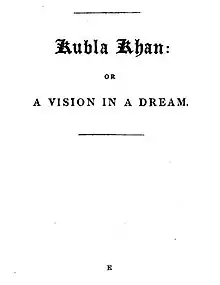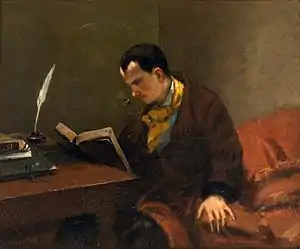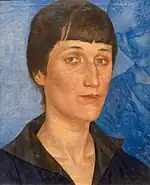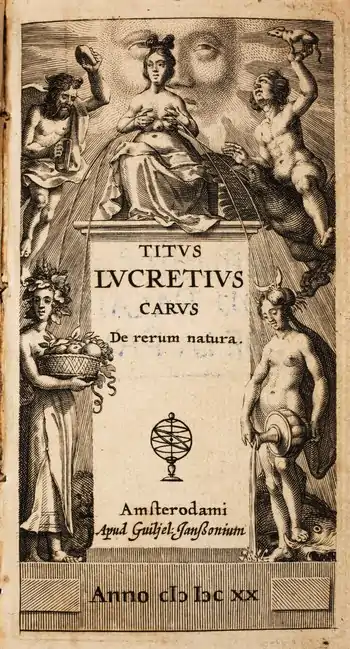Portal:Poetry
Welcome to the Poetry Portal


Poetry (a term derived from the Greek word poiesis, "making"), also called verse, is a form of literature that uses aesthetic and often rhythmic qualities of language − such as phonaesthetics, sound symbolism, and metre − to evoke meanings in addition to, or in place of, a prosaic ostensible meaning. A poem is a literary composition, written by a poet, using this principle.
Poetry has a long and varied history, evolving differentially across the globe. It dates back at least to prehistoric times with hunting poetry in Africa and to panegyric and elegiac court poetry of the empires of the Nile, Niger, and Volta River valleys. Some of the earliest written poetry in Africa occurs among the Pyramid Texts written during the 25th century BCE. The earliest surviving Western Asian epic poem, the Epic of Gilgamesh, was written in the Sumerian language.
Early poems in the Eurasian continent evolved from folk songs such as the Chinese Shijing as well as from religious hymns (the Sanskrit Rigveda, the Zoroastrian Gathas, the Hurrian songs, and the Hebrew Psalms); or from a need to retell oral epics, as with the Egyptian Story of Sinuhe, Indian epic poetry, and the Homeric epics, the Iliad and the Odyssey. (Full article...)
Selected article

Some of Coleridge's contemporaries denounced the poem and questioned his story about its origin. It was not until years later that critics began to openly admire the poem. Most modern critics now view Kubla Khan as one of Coleridge's three great poems, with The Rime of the Ancient Mariner and Christabel. The poem is considered one of the most famous examples of Romanticism in English poetry. A copy of the manuscript is a permanent exhibit at the British Museum in London. (Full article...)
Selected image
Poetry WikiProject

Selected biography

Akhmatova's work ranges from short lyric poems to intricately structured cycles, such as Requiem (1935–40), her tragic masterpiece about the Stalinist terror. Her style, characterised by its economy and emotional restraint, was strikingly original and distinctive to her contemporaries. The strong and clear leading female voice struck a new chord in Russian poetry. Her writing can be said to fall into two periods – the early work (1912–25) and her later work (from around 1936 until her death), divided by a decade of reduced literary output. Her work was condemned and censored by Stalinist authorities and she is notable for choosing not to emigrate, and remaining in Russia, acting as witness to the atrocities around her. Her perennial themes include meditations on time and memory, and the difficulties of living and writing in the shadow of Stalinism. (Full article...)
Did you know (auto-generated) -
- ... that a line from the 1899 poem "Sympathy" provided the title for Maya Angelou's autobiography I Know Why the Caged Bird Sings?
- ... that the name of the band Zuriaake is a metaphor for the Chinese poet Qu Yuan, who drowned himself due to his hatred of the government?
- ... that computer science professor Ruth Aylett performed with a robot poet in the Edinburgh Free Fringe?
- ... that Saudi Arabian poet Hamad al-Hajji lost three members of his family during his childhood and later suffered from schizophrenia until he died at the age of 49 after a lung disease?
- ... that Dolores Cabrera y Heredia, a Spanish Romantic poet and novelist, was a prominent member of Hermandad Lírica (Lyrical Sisterhood)?
- ... that Manuel Carpio's 1849 poem is the earliest literary depiction of the weeping ghost La Llorona?
Selected poem
| Eight Sonnets: Sonnet 1 by Edna St. Vincent Millay |
|---|
|
When you, that at this moment are to me |
Related portals
Topics
Recognized content
Categories
Associated Wikimedia
The following Wikimedia Foundation sister projects provide more on this subject:
-
 Commons
Commons
Free media repository -
 Wikibooks
Wikibooks
Free textbooks and manuals -
 Wikidata
Wikidata
Free knowledge base -
 Wikinews
Wikinews
Free-content news -
 Wikiquote
Wikiquote
Collection of quotations -
 Wikisource
Wikisource
Free-content library -
 Wikiversity
Wikiversity
Free learning tools -
 Wiktionary
Wiktionary
Dictionary and thesaurus
-
 List of all portalsList of all portals
List of all portalsList of all portals -
 The arts portal
The arts portal -
 Biography portal
Biography portal -
 Current events portal
Current events portal -
 Geography portal
Geography portal -
 History portal
History portal -
 Mathematics portal
Mathematics portal -
 Science portal
Science portal -
 Society portal
Society portal -
 Technology portal
Technology portal -
 Random portalRandom portal
Random portalRandom portal -
 WikiProject PortalsWikiProject Portals
WikiProject PortalsWikiProject Portals
